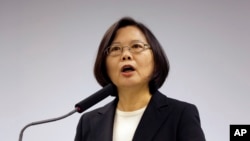Taiwan's president elect says she will maintain the status quo for relations with China, but will prioritize democracy and make decisions that transcend party politics.
Tsai Ing-wen said Wednesday while visiting Taiwan's Mainland Affairs Council that what will be different in her administration from the past eight years is cross-strait ties will be based on "the principle of democracy and people's desires."
Tsai has said she will maintain the status quo, but has not elaborated on how she will incorporate her commitment to democracy. Additionally, Tsai's Democratic Progressive Party has historically supported independence for Taiwan.
But Current Taiwan President Ma Ying-jeou has been criticized by opponents for pro-China policies they say are aimed at eventual reunification.
Recently relations between Tapei and Beijing have been increasingly tense, particularly after the deportation of 45 Taiwanese from Kenya to China where they are wanted for fraud, a move Taipei believes to be more about politics than crime.
China considers Taiwan part of its territory awaiting reunification, by force if necessary. The two countries split in 1949 after a civil war.




